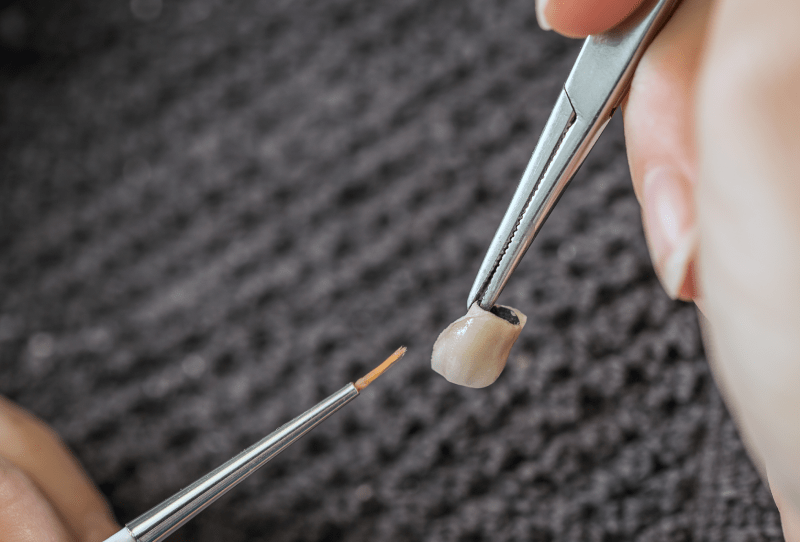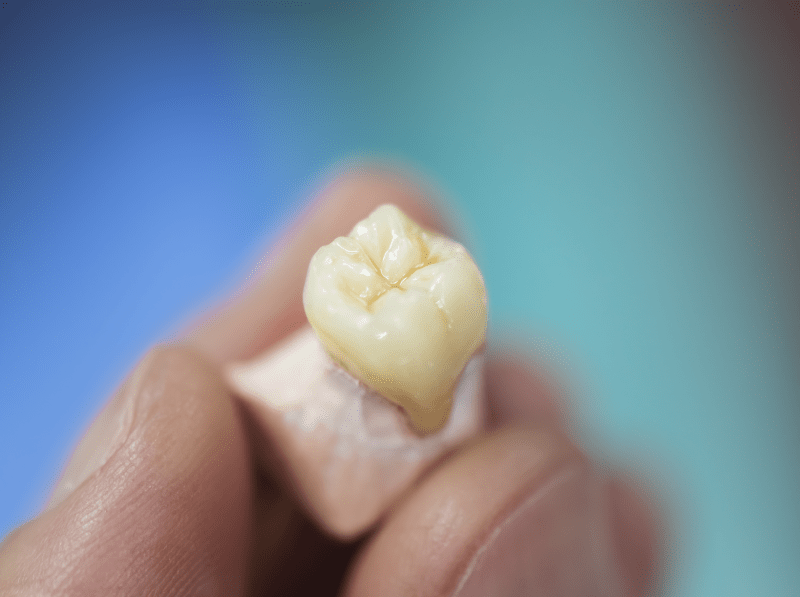Are Dental Crowns Painful?
A dental crown is a dental prosthetic that is placed over a tooth that is damaged to protect it from further harm. It can also be used as a cosmetic dental treatment to cover visual flaws on the surface of the tooth such as stains and discolorations.
While getting dental crowns has many benefits, many people worry about visiting the dentist because they are afraid the dental operation itself or the following recovery period will be painful.
Does Dental Crown Operation Hurt?
You do not need to feel anxious about getting dental crowns because the operation is often quite painless.
There are two options when getting a dental crown: the crown can be placed on top of dental implants or the natural roots. If your tooth root is healthy and not damaged, dental crowns can be mounted on the root after tooth preparation. The tooth preparation procedure for dental crowns entails the removal of tooth tissue from all sides of the tooth. This is done in order for the crown to fit properly without being too chunky.
The tooth enamel and tissue removal may cause some discomfort but it won’t be painful. You may experience some tooth sensitivity as a result. The sensitivity will go away once you receive your permanent dental crown. The installation of the dental crown does not cause any pain either.
Why is My Dental Crown Hurting?

While the operation is quite pain-free, it is possible that you experience some discomfort because of the dental crown later on. If you are having ongoing problems with your dental crowns, there might be several reasons why. Let’s look at some of the possible causes of dental crown pain and how to treat them.
Tooth Decay: While a dental crown can cover and protect a damaged tooth from outside damage, the tooth can still decay under the crown. Since the tooth beneath the dental crown is still functional, tooth decay or new cavities could form there. If your tooth develops cavities under the crown, it could cause toothache and pain.
If a dental cavity deepens to the point that it affects the nerve, a root canal procedure may be necessary.
Infections: When a tooth is damaged, it can affect the nerves and cause infections. There are many causes for this, such as bacterial plaque buildup or leakage from previous fillings, etc. If there is an active infection under the crown, you can experience swelling around the tooth, sensitivity, bleeding or swollen gums, or severe pain when chewing. These symptoms have little to do with the dental crown itself, but they point out advanced nerve infection. Root canal treatment may be necessary for this situation.
Gum Irritation: Dental crown placement is a fairly simple procedure. Generally, it can be completed without any complications. However, it is possible that the gums get irritated during the procedure.
In this case, you might feel some discomfort after the procedure. This usually stops after a couple of days or a week. You should visit a dentist if you experience significant pain following a dental crown procedure or if it persists for longer than two weeks.
Inaccurate Crown Fit: If your dental crown is a perfect fit, you should not even notice it in your mouth. It is normal that the new dental crown feels unfamiliar in the first few days after you get it. However, if it does not settle in after those days, it might not be a proper fit. If a dental crown is poorly placed or its size is wrong, it can cause some problems. It might feel loose or slightly move. You might experience discomfort or pain when chewing food, food could get stuck under the crown, or it could irritate your gums.
Your dentist can reshape or adjust your dental crown when necessary. If you think your crown does not fit properly, reach out to your dentist as soon as possible.
Teeth Grinding (Bruxism): Bruxism is when you clench your jaw and grind your teeth unconsciously during the night or day. It can put a lot of pressure on the teeth over time and cause pain in your teeth, jaw, face, and neck. It can negatively affect the dental crown and even cause it to fail. If you suffer from this condition, consult a medical professional to learn more about treatment options.
What Can Help With Tooth Pain?

The type of treatment depends on the underlying reason and intensity of discomfort experienced following the dental crown procedure. The basic actions listed below can assist to reduce the discomfort.
Your dentist may prescribe painkillers to treat your sensitivity and pain from your dental crown. Painkillers are usually very effective at relieving toothaches.
You can use salt water to rinse your mouth. Saltwater mouthwashes can aid in reducing pain and inflammation. The pain can be relieved by swishing warm water with a half teaspoon of salt in your mouth for 30 seconds several times each day.
You should also avoid foods such as sticky, chewy, or hard after getting a dental crown. Also, hot and cold foods and beverages can cause sensitivity and discomfort in the couple of days after the procedure.
Where to Get Dental Crowns? Getting Dental Crowns in Turkey

Dental crowns can be great solutions for missing teeth, tooth damage, or cosmetic dental concerns. However, they can be expensive and the waits for dentist appointments can be very long depending on where you live.
Today, one possible alternative for getting affordable and convenient dental treatments is to travel abroad. Every year, thousands of people fly to countries where medical treatments are less expensive. Dental tourism is especially getting more popular as traveling across countries is becoming more accessible.
At CureHoliday, we are working with some of the most successful dental clinics in Turkey. If you are interested in learning more about dental crown treatments in Turkey and special price offers, you can contact us through our message line or via e-mail.
One of the biggest advantages of getting dental treatments in Turkey is affordability. You can save considerable amounts of money if you decide to visit Turkey for your treatment. Often, all expenses in Turkey including flight tickets, dental treatment, and accommodation end up being less expensive than what you would pay in some countries.
Our partner dentists in Turkey will offer you a free consultation and we would be happy to answer your all questions. You can send us high-quality pictures of your mouth or dental x-rays if available so that we can prepare a dental treatment for you.
We are also offering full dental crown holiday packages to make your stay in Turkey more comfortable. The packages will include everything you need such as accommodation, hotel privileges, and transportation via VIP car.
